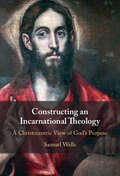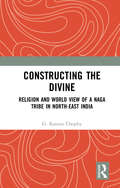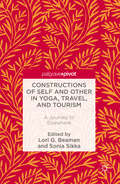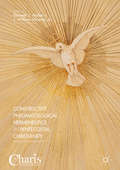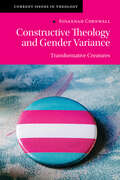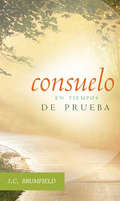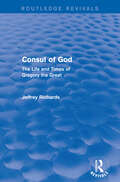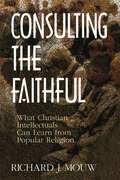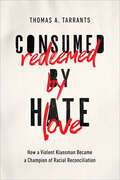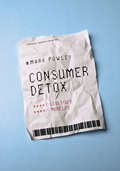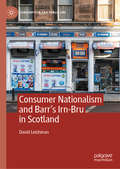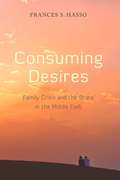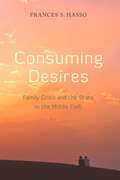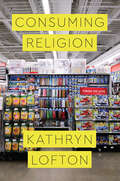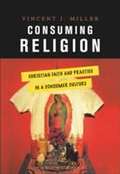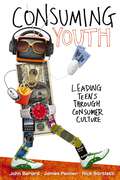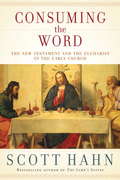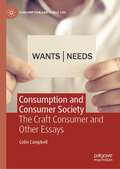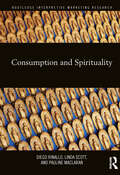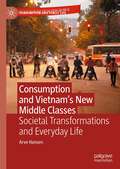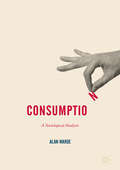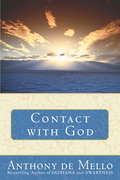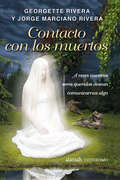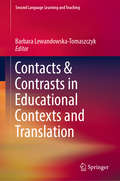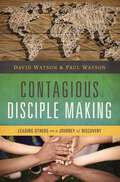- Table View
- List View
Constructing an Incarnational Theology: A Christocentric View of God's Purpose
by Samuel WellsWhy did Jesus come? The traditional argument is that he came to redeem us from sin and destroy death, and thus reverse the fall. Many have long found this unsatisfactory, because it centres human deficit, rather than divine abundance. In this study, Samuel Wells traces his notion of 'being with' right into the Trinity itself, and in dialogue with Maximus the Confessor, Duns Scotus and Karl Barth, among others, articulates a truly Christocentric theology in which God's means and God's ends are identical. In the process, Wells not only greatly expands the compass of 'being with,' showing its scriptural and doctrinal significance, but also offers a constructive account of the incarnation, cross and resurrection of Jesus that out-narrates conventional atonement theories. Wells correspondingly proposes an account of sin, evil, suffering and death that accords with this revised understanding. The result is a compelling and transformational proposal in incarnational theology.
Constructing the Divine: Religion and World View of a Naga Tribe in North-East India
by G. Kanato ChophyFrom being characterized as ‘primitive tribe’ in the colonial imagination to become predominantly practitioners of the American Baptist faith, the Sumi Naga – formerly known as the Sema Naga – in the North-East Indian state of Nagaland have come a long way ever since this Naga tribe encountered the white man toward the latter half of the nineteenth century.This book in a way chronicles the transition of Sumi society from the period of colonial contact up to the present-day context. A critical understanding of Sumi society and culture is at the heart of the narrative, and the analysis of Sumi religion and world view remains the main thrust of this book. It is argued that the Sumi, who are overwhelmingly Baptists, are faced with new religious issues which has brought about not only schismatic divisions but also rendering ebullience to religious life, and that a new discourse has emerged in Sumi religion. The author positions himself as an ‘insider’, and in doing so has given a reflexive account of Sumi religious life, meanwhile substantiating the arguments and findings in the light of contemporary theoretical developments. The volume brings out compelling evidence that religion significantly shapes the daily life of the Sumi. It offers a detailed ethnographic study of Sumi religion and world view, as the Sumi Naga was seldom studied in-depth in the post-Independence period. Please note: Taylor & Francis does not sell or distribute the Hardback in India, Pakistan, Nepal, Bhutan, Bangladesh and Sri Lanka
Constructions of Self and Other in Yoga, Travel, and Tourism: A Journey to Elsewhere
by Sonia Sikka Lori G. BeamanThis volume considers the phenomenon of yoga travel as an instance of a broader genre of spiritual travel involving journeys to places elsewhere, which are imagined to offer the possibility of profound personal transformation. These imaginings are tied up in a continued exoticization of the East, but they are not limited to that. Contributors identify various themes such as authenticity, suffering, space, material markers, and the idea of the spiritual, tracing how these ideas manifest in conceptions and fetishizations of elsewhere. To deepen its analysis of this phenomenon, the book incorporates a wide range of disciplines including architecture, sociology, anthropology, philosophy, women s studies, religious studies, and history. While the book s primary focus is yoga and yoga travel, contributors offer up an array of other case studies. Chapters delve into the complex questions of agency and authenticity that accompany the concept of spiritual travel and ideas of elsewhere. "
Constructive Pneumatological Hermeneutics in Pentecostal Christianity (Christianity and Renewal - Interdisciplinary Studies)
by Kenneth J. Archer And L. William Oliverio Jr.This book presents the work of leading hermeneutical theorists alongside emerging thinkers, examining the current state of hermeneutics within the Pentecostal tradition. The volume’s contributors present constructive ideas about the future of hermeneutics at the intersection of theology of the Spirit, Pentecostal Christianity, and other disciplines. This collection offers cutting-edge scholarship that engages with and pulls from a broad range of fields and points toward the future of Pneumatological hermeneutics. The volume’s interdisciplinary essays are broken up into four sections: philosophical hermeneutics, biblical-theological hermeneutics, social and cultural hermeneutics, and hermeneutics in the social and physical sciences.
Constructive Theology and Gender Variance: Transformative Creatures (Current Issues in Theology)
by Susannah CornwallSome Christians are anxious and uncomfortable about gender diversity and transition. Sometimes, they understand these issues as a rejection of God's intention for creation. Gender diversity has also been assumed to entail self-deception, mental ill-health, and dysphoria. Yet, humans are inherently transformative creatures with a vocation to shape their own worlds and traditions. Transformative creaturely theology recognizes the capacity of gender to shape humans even as we also question it. In this book, Susannah Cornwall reframes the issues of gender diversity and transition in constructive Christian theological terms. Resisting deficit-based discourses, she presents gender diversity in a way that is positive and non-oppositional. Her volume explores questions of the licit limits of technological interventions for human bodies, how gender diversity maps onto understandings of health, and the ethics of disclosure of gender diversity. It also brings these topics into critical conversation with constructive Christian theologies of creation, theological anthropology, Christology, and eschatology.
Consuelo en tiempos de prueba
by J. C. BrumfieldEn medio de laprueba, a menudo es difícil ver que nuestro sufrimiento tenga algún propósito. Consuelo en tiempos de prueba nos ayudaráa comprender que Dios nunca nos deja ni nos desampara, especialmente en losmomentos difíciles. El aliento bíblico consolador en este libro explica elpapel que desempeña Dios y su propósito en ponernos a prueba y ofrece un patrónpara alcanzar el éxito para todos los cristianos que están "pasando por elfuego". Este libro ya ha vendido dos millones de ejemplares en inglés comofolleto y ahora está disponible en un formato más atractivo y más fácil de leer.
Consul of God: The Life and Times of Gregory the Great (Routledge Revivals)
by Jeffrey RichardsGregory the Great, whose reign spanned the years between 590 and 604 A.D., was one of the most remarkable figures of the early medieval Papacy. Aristocrat, administrator, teacher and scholar, he ascended the throne of St Peter at a time of acute crisis for the Roman Church. Consul of God, first published in 1980, revises the traditional picture of Pope Gregory. It examines how he organised the central administration of the Papacy and his unremitting war on heresy and schism. Gregory also pioneered a new pastoral tradition in learning, promoted monasticism, and trained the episcopate. Jeffrey Richards demonstrates that Gregory was both a conservative and a pioneer, and just as his reign looked forward to the medieval world it also looked back to a vanishing world of imperial unity. He was thus the last representative of those Roman senators whose fortitude and energy he emulated, earning the epitaph ‘Consul of God’.
Consulting the Faithful: What Christian Intellectuals Can Learn from Popular Religion
by Richard J. MouwThis is a print on demand book and is therefore non- returnable. In this careful assessment of contemporary religious trends, Mouw remains committed to theological orthodoxy while also asserting that the Christian intellectual community should pay careful and sympathetic attention to popular religious culture. Probing the thought of some theological giants of the past — John Henry Newman, Abraham Kuyper, and others — Mouw advocates a "hermeneutic of charity" toward popular religion and says that Christian scholars, besides teaching the "little people" of the church, must also learn from the "practical theological wisdom" of laypeople.
Consumed by Hate, Redeemed by Love: How a Violent Klansman Became a Champion of Racial Reconciliation
by Thomas A. Tarrants"Riveting, inspiring, at times hard to believe but utterly true...it gives some measure of hope in these rancorous times." -- John GrishamAs an ordinary high school student in the 1960s, Tom Tarrants became deeply unsettled by the social upheaval of the era. In response, he turned for answers to extremist ideology and was soon utterly radicalized. Before long, he became involved in the reign of terror spread by Mississippi's dreaded White Knights of the Ku Klux Klan, described by the FBI as the most violent right-wing terrorist organization in America.In 1969, while attempting to bomb the home of a Jewish leader in Meridian, Mississippi, Tom was ambushed by law enforcement and shot multiple times during a high-speed chase. Nearly dead from his wounds, he was arrested and sentenced to thirty years in the Mississippi State Penitentiary at Parchman Farm. Unrepentant, Tom and two other inmates made a daring escape from Parchman yet were tracked down by an FBI SWAT team and apprehended in hail of bullets that killed one of the convicts. Tom spent the next three years alone in a six-foot-by-nine-foot cell. There he began a search for truth that led him to the Bible and a reading of the gospels, resulting in his conversion to Jesus Christ and liberation from the grip of racial hatred and violence.Astounded by the change in Tom, many of the very people who worked to put him behind bars began advocating for his release. After serving eight years of a 35-year sentence, Tom left prison. He attended college, moved to Washington, DC, and became copastor of a racially mixed church. He went on to earn a doctorate and became the president of the C. S. Lewis Institute, where he devoted himself to helping others become wholehearted followers of Jesus.A dramatic story of radical transformation, Consumed by Hate, Redeemed by Love demonstrates that hope is not lost even in the most tumultuous of times, even those similar to our own."As a kid in Mississippi in the late 1960's, I remember the men of our church discussing the Klan's bombing campaign against the Jews. The men did not disapprove. Later, I would use this fascinating chapter of civil rights history as the backdrop for my novel The Chamber. Now, one of the bombers, Thomas Tarrants, tells the real story in this remarkable memoir. It is riveting, inspiring, at times hard to believe but utterly true, and it gives some measure of hope in these rancorous times." --John Grisham"Dramatic...Simply astonishing...Essential reading for these times. If you want to understand how the evil of extremist thought works--and how the gospel of God&’s grace can overcome it--read this book." --Mark Batterson, New York Times bestselling author of The Circle Maker, lead pastor of National Community Church"Amazing...Gives hope for what God can do." --Dr. John Perkins, president emeritus, John Perkins Foundation; co-founder emeritus, Christian Community Development Association"A riveting narrative." --Russell Moore, president, the Ethics & Religious Liberty Commission of the Southern Baptist Convention"This gripping and inspiring story is as timely as today&’s headlines....Put on your seatbelt and prepare to enter into one of the most extraordinary true stories you&’ll ever encounter!" --Lee Strobel, best-selling author of The Case for Christ and The Case for Grace"Reveals how easily a political ideology can grow into a radical, extreme, life-taking worldview, all the while masquerading for some supposed form of a 'Christian' faith....A powerful story!" --Eric C. Redmond, associate professor of Bible, Moody Bible Institute, Chicago
Consumer Detox: Less Stuff, More Life
by Revd. Mark PowleyConsumerism is everywhere. It shapes the way we eat, shop, rest, think, love and believe. We can’t escape it, but how can we live well in the midst of it? We are daily seduced by a 250 billion dollar marketing machine. But how often do we consider how this might influence us? The current prevailing orthodoxy is that life should be lived to the max. By contrast, Jesus modeled a life of joyful limitation – free to do; free not to do. Consumer Detox, complete with the Detox Diary in the back of the book with suggestions for each chapter, encouraging stories, and space for writing personal reflections, is for those who want to break out of a lifestyle dominated by consumerism and journey toward a richer, simpler, more generous life. Consumer Detox, written out of Mark Powley’s experience of making a change in his own life, is a three part book that will help you break out of the consumer mindset, slow down to enjoy the natural rhythms of life, and live a life of generosity. This book isn’t about living a smaller life but having a bigger vision, which can help you become everything you were made to be.
Consumer Nationalism and Barr’s Irn-Bru in Scotland: Iron Nation (Consumption and Public Life)
by David LeishmanThis book connects a detailed analysis of Irn-Bru’s brand identity over time to theories of national identity, consumer studies, and banal nationalism. It situates the commercial history of Barr’s Irn-Bru in a transnational context and shows how Irn-Bru has become a symbol of Scotland through processes of rewriting, reframing and institutionalized forgetting, linking the consumption of what began as a trans-national generic product to a specific national community. As such, Leishman presents a longitudinal, cross-disciplinary approach to analysing branding and advertising as multi-modal forms of discourse, in order to underline the role of commercial, non-state actors and popular consumerism in the phenomenon of banal nationalism. It will be of interest to students and scholars researching nationalism, consumption, and Scottish studies.
Consuming Desires: Family Crisis and the State in the Middle East
by Frances HassoOver the course of the twentieth century, most Middle East states adopted a shari'a-based system for recognizing marriages. Partly in reaction to these dynamics, new types of marriage that evade the control of the state and religious authorities have emerged. These marriages allow for men and women to engage in sexual relationships, but do not require that they register the marriage with the state, that they live together, or that the man be financially responsible for the wife or household. In Consuming Desires, Frances Hasso explores the extent to which these new relationship forms are used and to what ends, as well as the legal and cultural responses to such innovations. She outlines what is at stake for the various groups--the state, religious leaders, opposition groups, young people, men and women of different classes and locations, and feminist organizations--in arguments for and against these relationship forms.
Consuming Desires: Family Crisis and the State in the Middle East
by Frances HassoOver the course of the twentieth century, most Middle East states adopted a shari'a-based system for recognizing marriages. Partly in reaction to these dynamics, new types of marriage that evade the control of the state and religious authorities have emerged. These marriages allow for men and women to engage in sexual relationships, but do not require that they register the marriage with the state, that they live together, or that the man be financially responsible for the wife or household. In Consuming Desires, Frances Hasso explores the extent to which these new relationship forms are used and to what ends, as well as the legal and cultural responses to such innovations. She outlines what is at stake for the various groups—the state, religious leaders, opposition groups, young people, men and women of different classes and locations, and feminist organizations—in arguments for and against these relationship forms.
Consuming Religion (Class 200: New Studies in Religion)
by Kathryn LoftonWhat are you drawn to like, to watch, or even to binge? What are you free to consume, and what do you become through consumption? These questions of desire and value, Kathryn Lofton argues, are questions for the study of religion. In eleven essays exploring soap and office cubicles, Britney Spears and the Kardashians, corporate culture and Goldman Sachs, Lofton shows the conceptual levers of religion in thinking about social modes of encounter, use, and longing. Wherever we see people articulate their dreams of and for the world, wherever we see those dreams organized into protocols, images, manuals, and contracts, we glimpse what the word “religion” allows us to describe and understand. With great style and analytical acumen, Lofton offers the ultimate guide to religion and consumption in our capitalizing times.
Consuming Religion: Christian Faith And Practice In A Consumer Culture
by Vincent MillerContemporary theology, argues Miller, is silent on what is unquestionably one of the most important cultural issues it faces: consumerism or "consumer culture." While there is no shortage of expressions of concern about the corrosive effects of consumerism from the standpoint of economic justice or environmental ethics, there is a surprising paucity of theoretically sophisticated works on the topic, for consumerism, argues Miller, is not just about behavioral "excesses"; rather, it is a pervasive worldview that affects our construction as persons-what motivates us, how we relate to others, to culture, and to religion. Consuming Religion surveys almost a century of scholarly literature on consumerism and the commodification of culture and charts the ways in which religious belief and practice have been transformed by the dominant consumer culture of the West. It demonstrates the significance of this seismic cultural shift for theological method, doctrine, belief, community, and theological anthropology. Like more popular texts, the book takes a critical stand against the deleterious effects of consumerism. However, its analytical complexity provides the basis for developing more sophisticated tactics for addressing these problems.
Consuming Youth: Navigating youth from being consumers to being consumed
by James Penner John Berard Rick BartlettToday’s relentless, consumer culture—dominated by popular media’s emphasis on bigger, better, and more, and catering to teenagers every want and desire—is leaving our youth adrift in a sea of conflicting messages. Messages that every youth worker must be able to decode and redirect away from the material world towards helping young people become who God created them to be: givers instead of receivers, servers instead of consumers. Consuming Youth is for any adult who recognizes that following Jesus means leading young people through the pitfalls of consumer culture, helping them discover vocation—where their great gladness meets a world's great need, and unleashing the kingdom of God on earth.
Consuming the Word: The New Testament And The Eucharist In The Early Church
by Scott HahnFrom the bestselling author of The Lamb's Supper and Signs of Life comes an illuminating work that unlocks the many mysteries of the Catholic sacrament of the Eucharist.Long before the New Testament was a document, it was a sacrament. Jesus called the Eucharist by the name Christians subsequently gave to the latter books of the Holy Bible. It was the "New Covenant," the "New Testament," in his blood. Christians later extended the phrase to cover the books produced by the apostles and their companions; but they did so because these were the books that could be read at Mass. This simple and demonstrable historical fact has enormous implications for the way we read the Bible. In Consuming the Word: The New Testament and the Eucharist in the Early Church, Dr. Scott Hahn undertakes an examination of some of Christianity's most basic terms to discover what they meant to the sacred authors, the apostolic preachers, and their first hearers. Moreover, at a time when the Church is embarking on a New Evangelization he draws lessons for Christians today to help solidify their understanding of the why it is Catholics do what Catholics do. Anyone acquainted with the rich body of writing that flows so inspiringly from the hand and heart of Dr. Hahn knows that he brings profound personal insight to his demonstrated theological expertise," writes Cardinal Donald Wuerl in the foreword to the book. Consuming the Word continues in that illustrious tradition. It brings us a powerful and welcome guide as we take our place in the great and challenging work in sharing the Good News. From the Hardcover edition.
Consumption and Consumer Society: The Craft Consumer and Other Essays (Consumption and Public Life)
by Colin CampbellThis collection of high quality, largely previously published essays, analyses a range of controversies in the field of the sociology of culture and consumption. Campbell made a major contribution to the development of this field and he has a clear and coherent theoretical position which he employs to comment on interesting disputes among scholars seeking to understand consumer culture.Containing a brand new expansive essay reflecting on consumption in the age of a pandemic and drawing out some of the conceptual and practical implications of the relationship between wants and needs, science and norms, this synthesis will be an invaluable resource for students and researchers of consumption, consumer and cultural sociology.
Consumption and Spirituality (Routledge Interpretive Marketing Research)
by Linda Scott Pauline Maclaran Diego RinalloThis book sheds light on the consumption of spiritual products, services, experiences, and places through state-of-the-art studies by leading and emerging scholars in interpretive consumer research, marketing, sociology, anthropology, cultural, and religious studies. The collection brings together fresh views and scholarship on a cultural tension that is at the centre of the lives of countless individuals living in postmodern societies: the relationship between the material and the spiritual, the sacred and the profane. The book examines how a variety of agents – religious institutions, spiritual leaders, marketers and consumers – interact and co-create spiritual meanings in a post-disenchanted society that has been defined as a ‘supermarket of the soul.’ Consumption and Spirituality examines not only religious organizations, but also brands and marketers and the way they infuse their products, services and experiences with spiritual meanings that flow freely in the circuit of culture and can be appropriated by consumers even without purchase acts. From a consumer perspective, the book investigates how spiritual beliefs, practices, and experiences are now embedded into a global consumer culture. Rather than condemning consumption, the chapters in this book highlight consumers’ agency and the creative processes through which authentic spiritual meanings are co-created from a variety of sources, local and global, and sacred and profane alike.
Consumption and Vietnam’s New Middle Classes: Societal Transformations and Everyday Life (Consumption and Public Life)
by Arve HansenThis book studies the dramatic changes in consumption patterns in Vietnam over the past decades, combining a focus on everyday practices and societal transformations. Zooming in on the new urban middle classes, and through in-depth case studies in the realms of mobility, food and energy, the book brings new insights to some of the most urgent global sustainability challenges. Based on a decade of research in Vietnam, the book aims to contribute to better understanding one of the most fascinating ‘development success stories’ in the world. It introduces the term ‘consumer socialism’ to analyse some of the contradictions embedded in the socialist market economy. Simultaneously, the book aims to contribute to strengthening consumption research in and on emerging economies, and for this purpose develops a theoretical approach focusing on social practices and the political economy of consumption.
Consumption: A Sociological Analysis (Consumption and Public Life)
by Alan WardeThis book critically reviews recent social scientific investigations of consumption, a controversial topic with moral overtones, and of popular public interest and political and economic significance. The author explores how consumption affects personal identity and social position, developing a sociological analysis using theories of practice to account for everyday consumption, its role in the social order, and its consequences for environmental sustainability. The book offers a controversial analysis which explains consumption not in terms of the purchasing of commodities but of the organization and coordination of daily practices. Consumption will be of interest to scholars and students of sociology, anthropology, geography, cultural studies, consumer research, business studies and social theory.
Contact with God: Retreat Conferences
by Anthony De MelloAnthony De Mello suggestions for how to get the most out of retreat experiences. As he explores the subject of prayer, penance, and the love of Christ, De Mello shares some of his personal encounters.
Contacto con los muertos
by Georgette RiveraA veces nuestros seres queridos desean comunicarnos algo. Contacto con los muertos es un libro impactante y generoso en la transmisión de sus mensajes, no engaña con falsas revelaciones y advierte explícitamente sobre las posibilidades que tienen las personas de establecer un contacto. Desataca la manera clara y directa en que los autores comparten sus experiencias y conocimientos: no ofrecen milagros; lejos de las propuestas que charlatanes y supuestos maestros del ocultismo brindan a sus lectores. Sin duda este libro causará gran revuelo y emoción entre creyentes y escépticos.
Contacts and Contrasts in Educational Contexts and Translation (Second Language Learning and Teaching)
by Barbara Lewandowska-TomaszczykThis volume covers descriptions and interpretations of social and cognitive phenomena and processes which emerge at the interface of languages and cultures in educational and translation contexts. It contains eleven papers, divided into two parts, which focus respectively on the issues of language and culture acquisition and a variety of translation practices (general language, literature, music translation) from socio-cultural and cognitive perspectives.
Contagious Disciple Making: Leading Others on a Journey of Discovery
by David WatsonIt is hard to deny that today's world can seem apathetic toward Christians. Some may look down at their iPhones when we mention God, motion for the check when we bring up church, or casually change the subject when we talk about prayer. In a world full of people whose indifference is greater than their desire to know Christ, how can we dream of growing the church? In Contagious Disciple Making, David Watson and Paul Watson map out a simple method that has sparked an explosion of homegrown churches in the United States and around the world. A companion to Cityteam's two previous books, Miraculous Movements and The Father Glorified, Contagious Disciple Making details the method used by Cityteam disciple-makers. This distinctive process focuses on equipping spiritual leaders in communities where churches are planted. Unlike many evangelism and church-growth products that focus on quick results, contagious disciple-making takes time to cultivate spiritual leadership, resulting in lasting disciple-making movements. Through Contagious Disciple Making readers will come to understand that a strong and equipped leader will continue to grow the church long after church planters move on to the next church. Features include:Engagement tools for use in the fieldPractical techniques to equip others to make disciples
